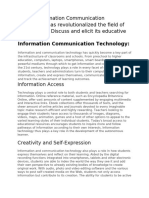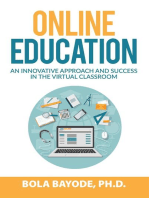Draft 1
Draft 1
Uploaded by
Thư BùiCopyright:
Available Formats
Draft 1
Draft 1
Uploaded by
Thư BùiOriginal Description:
Copyright
Available Formats
Share this document
Did you find this document useful?
Is this content inappropriate?
Copyright:
Available Formats
Draft 1
Draft 1
Uploaded by
Thư BùiCopyright:
Available Formats
Họ và Tên: Bùi Phạm Đăng Thư
Topic: In the modern world, schools are no longer necessary because there is so much
information available through the internet that children can study just as well at home. To
what extent do you agree or disagree?
ANSWER
In the era of astonishing booms in technology, issues related to education has emerged as a
bone of contention. In reality, some people opine that schools have been made redundant since
students are able to access all the information they need to study at home. I vehemently
disapprove of this statement due to the reasons as follows.
First and foremost, it is obvious that structured learning environments are crucial for effective
education. As a matter of fact, almost every school offer a well-organized curriculum, delivered
by qualified teachers who guide students through their academic journeys. This means they
provide children with a balanced mix of instruction, practice, and assessment, ensuring
comprehensive learning experiences and then enhancing students’ studying. While the internet
may offer vast amounts of information, it lacks the structured approach and guidance provided
by teachers in a classroom setting.
Secondly, the social development aspect of education is invaluable for students. To be more
detailed, schools have a tendency to provide a platform for individuals to interact with their
peers, developing crucial social skills, empathy, and teamwork. As a result, those in-person
interactions presumably foster a sense of community, allowing students to grow both
academically and socially. The internet, on the other hand, lacks the same level of personal
connection and collective growth that schools can provide.
People who think schools are outdated in the age of the internet might argue that the Internet
can offer personalized and self-directed learning experiences as online platforms with adaptive
learning technologies can provide tailored educational content. They have their own points in
reasoning that way. However, this approach typically neglects the significance of human
interactions and the social component of education. Learning solely through the Internet can
lead to a lack of practical application, limited student engagement, and diminished critical
thinking skills.
To conclude, while the internet serves as a valuable tool for education, schools cannot be
replaced entirely since the social development and structured learning environments provided
by schools offer distinctive advantages that foster comprehensive learning experiences. I firmly
believe that recognizing and preserving the critical role of schools in education is essential for
ensuring the holistic growth and development of students.
You might also like
- Perspectives Upper Intermediate Unit 2Document14 pagesPerspectives Upper Intermediate Unit 2Mariia BarnaNo ratings yet
- Debate Computer and TeacherDocument12 pagesDebate Computer and TeacherNCCA NCCANo ratings yet
- Technology in SchoolsDocument1 pageTechnology in SchoolsDragon KingNo ratings yet
- WRDocument1 pageWRÁnh Dương BùiNo ratings yet
- Despite The Wealth of Information Available On The Internet in The Digital EraDocument1 pageDespite The Wealth of Information Available On The Internet in The Digital EraĐan NhiNo ratings yet
- Unnecessary SchoolDocument2 pagesUnnecessary SchoolNguyễn Đức ChâuNo ratings yet
- Kira Alava - W2 PDFDocument2 pagesKira Alava - W2 PDFKYRA ALEJANDRA ALAVA ORCESNo ratings yet
- Untitled Document - Edited-2Document1 pageUntitled Document - Edited-2psmcqmvqh4No ratings yet
- The Debate Over Whether Students in Schools and Universities Learn More From Their Teachers Than Through Other Means Such As The InternetDocument1 pageThe Debate Over Whether Students in Schools and Universities Learn More From Their Teachers Than Through Other Means Such As The InternetMai BùiNo ratings yet
- Future LearningDocument7 pagesFuture LearningNor Azilawaty AzmiNo ratings yet
- Ss Writing 1 5Document9 pagesSs Writing 1 5benjaminmao245No ratings yet
- w1 draft 2Document2 pagesw1 draft 2nhi haNo ratings yet
- IELTS Writing Task 2 23-12-2023Document1 pageIELTS Writing Task 2 23-12-2023dat.tt0103No ratings yet
- In Developing Countries, Children in Rural Communities Have Less Access To EducationDocument1 pageIn Developing Countries, Children in Rural Communities Have Less Access To EducationKha NguyễnNo ratings yet
- Lee J - I-Search PaperDocument6 pagesLee J - I-Search Paperapi-618121022No ratings yet
- Writing 2 Ngọc ThảoDocument1 pageWriting 2 Ngọc Thảovidhtss180075No ratings yet
- Eip PaperDocument8 pagesEip Paperapi-252848357No ratings yet
- Effectiveness of Online EducationDocument5 pagesEffectiveness of Online EducationsamadoyeNo ratings yet
- Traditional Education Vs OneditDocument6 pagesTraditional Education Vs OneditptmforexguruNo ratings yet
- Finaltermpaper 21DH713589Document8 pagesFinaltermpaper 21DH713589hanhu.ewecNo ratings yet
- 01 Model AnswerDocument1 page01 Model AnswerLanNo ratings yet
- Effectiveness of Online EducationDocument6 pagesEffectiveness of Online EducationOlubukola OyedeleNo ratings yet
- TRADITIONAL VS ONLINE TEACHINGDocument1 pageTRADITIONAL VS ONLINE TEACHINGNguyễn Quỳnh NhưNo ratings yet
- Position PaperDocument2 pagesPosition Papernathan casinaoNo ratings yet
- Teaching and Learning Online PaperDocument10 pagesTeaching and Learning Online Paperapi-344649238No ratings yet
- IIDocument2 pagesIItphuongquynh361No ratings yet
- Research Assignment 2Document7 pagesResearch Assignment 2api-534630138No ratings yet
- Touchstone 4 English Composition 1Document5 pagesTouchstone 4 English Composition 1gbenga bolarinwaNo ratings yet
- Essay 3'Document1 pageEssay 3'Hannah PhamNo ratings yet
- Educ 631 Research Paper Parson MitchellDocument12 pagesEduc 631 Research Paper Parson Mitchellapi-266443408No ratings yet
- AmorDocument21 pagesAmorjacl26372No ratings yet
- DocumentDocument3 pagesDocumentOlubukola OyedeleNo ratings yet
- Evaluation ReflectionDocument3 pagesEvaluation ReflectionGeisha Leigh Coruna CabiloganNo ratings yet
- Students Perceptions On Online EducationDocument4 pagesStudents Perceptions On Online EducationManisha AgarwalNo ratings yet
- IELTS Writing Task 2Document1 pageIELTS Writing Task 2Phúc PhanNo ratings yet
- Impact of Online EducationDocument3 pagesImpact of Online Educationrmm0415No ratings yet
- UntitledDocument3 pagesUntitledMarianne BalitaNo ratings yet
- Academic Paper First DraftDocument14 pagesAcademic Paper First Draftliz gamezNo ratings yet
- Ielts Buoi 1Document2 pagesIelts Buoi 1Thảo NguynNo ratings yet
- ReflectionDocument5 pagesReflectionJessiah Jade LeyvaNo ratings yet
- Essay 4Document1 pageEssay 4Gurpal VehniwalNo ratings yet
- PPITDocument4 pagesPPITTalha ZainNo ratings yet
- Final Pde Reflection Virtual TeachingDocument5 pagesFinal Pde Reflection Virtual Teachingapi-423244864No ratings yet
- Online Education ChallengesDocument3 pagesOnline Education ChallengesKarthikeyan R SNo ratings yet
- V. Review of Related Studies V.I. Local StudiesDocument4 pagesV. Review of Related Studies V.I. Local StudiesAce SagaynoNo ratings yet
- 6 Ka PDFDocument22 pages6 Ka PDFsuraj jaiswalNo ratings yet
- Writing Task 1 Online Teaching Versus Classroom TeachingDocument2 pagesWriting Task 1 Online Teaching Versus Classroom TeachingramananNo ratings yet
- E Learning EssayDocument1 pageE Learning EssayDebashish Roy100% (1)
- 16 SitemodalitiesDocument2 pages16 Sitemodalitiesapi-236636948No ratings yet
- Result_23_03_31 6_12_2024Document1 pageResult_23_03_31 6_12_2024nguyenthingoc83.tvNo ratings yet
- Traditional vs. Modern Teaching Methodology: Swati GuptaDocument7 pagesTraditional vs. Modern Teaching Methodology: Swati GuptaDarshit Thakkar100% (1)
- Information Communication TechnologyDocument23 pagesInformation Communication TechnologysabihaNo ratings yet
- Introduction To Impact of Online EducationDocument4 pagesIntroduction To Impact of Online EducationSurbhi JainNo ratings yet
- Writing Task 2 SamplesDocument2 pagesWriting Task 2 SamplesLe DucNo ratings yet
- CyanDocument2 pagesCyanArshelyn Donna NovenoNo ratings yet
- Lestari-Online LearningDocument2 pagesLestari-Online LearningLestari Ningrum Famouza BerkahNo ratings yet
- Pros and Cons of Social Media in The ClassroomDocument3 pagesPros and Cons of Social Media in The Classroomtri ulfa amelda0% (1)
- How Does The Internet Help College Students Develop Their Learning SkillsDocument4 pagesHow Does The Internet Help College Students Develop Their Learning Skillsapi-548946786No ratings yet
- Writing Task 2Document1 pageWriting Task 2Thuy Anh DoNo ratings yet
- Quality: As I See It Towards Academics.Document3 pagesQuality: As I See It Towards Academics.Dr Dheeraj MehrotraNo ratings yet
- Online Education: An Innovative Approach and Success in the Virtual ClassroomFrom EverandOnline Education: An Innovative Approach and Success in the Virtual ClassroomNo ratings yet
- Use An Interface Display Name Instead of Showing AIF Interface KeysDocument6 pagesUse An Interface Display Name Instead of Showing AIF Interface KeysLohithNo ratings yet
- 15CSE202 Object Oriented Programming: OO Analysis With Use CaseDocument30 pages15CSE202 Object Oriented Programming: OO Analysis With Use CaseSwaran KarthikeyanNo ratings yet
- Introduction To Navisworks: Learning ObjectivesDocument21 pagesIntroduction To Navisworks: Learning ObjectiveslexloxNo ratings yet
- Keamanan InformasiDocument2 pagesKeamanan InformasiSultan AlfarizNo ratings yet
- Class RecordDocument1 pageClass Recordmister notesNo ratings yet
- 16xe1 Digital RadioDocument6 pages16xe1 Digital RadioJorge BalzaNo ratings yet
- Artificial Intelligence AI Impact On Digital Marketing ResearchDocument10 pagesArtificial Intelligence AI Impact On Digital Marketing ResearchPRADYUMNA .SNo ratings yet
- TK103 GPS Tracker User ManualDocument11 pagesTK103 GPS Tracker User ManualCarlos CastilloNo ratings yet
- Syngress, Syngress Media - IP Addressing and Subnetting, Including IPv6-Syngress (1999)Document57 pagesSyngress, Syngress Media - IP Addressing and Subnetting, Including IPv6-Syngress (1999)Gilart A C KerrNo ratings yet
- Conclusion LabDocument3 pagesConclusion LabPatricia KCNo ratings yet
- Support MatrixDocument3 pagesSupport MatrixEdinson Peña LondoñoNo ratings yet
- SP-6 - Jenis-Jenis PencarianDocument3 pagesSP-6 - Jenis-Jenis PencarianMas SimonNo ratings yet
- How To Write A Rhyming PoemDocument71 pagesHow To Write A Rhyming PoemSannie RemotinNo ratings yet
- 6 - AirWalk - Rural CDMA 450 PresentationDocument18 pages6 - AirWalk - Rural CDMA 450 PresentationDaud SuleimanNo ratings yet
- Kraken Blade Gold Gpo - Recherche GoogleDocument1 pageKraken Blade Gold Gpo - Recherche Googleyounes charifNo ratings yet
- 01.02语法讲义-简单句【完整版】Document25 pages01.02语法讲义-简单句【完整版】chaunceyrollestonNo ratings yet
- Sujet de Dissertation Sur La Police AdministrativeDocument4 pagesSujet de Dissertation Sur La Police AdministrativeBuyPaperOnlineManchester67% (3)
- Ricoh UPD BestPracticesDocument25 pagesRicoh UPD BestPracticesWilson MosqueraNo ratings yet
- Opencart Bug ReportDocument14 pagesOpencart Bug ReportKarthik SudhakarNo ratings yet
- Prova Fadesp 2018Document25 pagesProva Fadesp 2018Rafael CruzNo ratings yet
- Introduction To Electronic Search Engine 7Document5 pagesIntroduction To Electronic Search Engine 7Mary Ann Sebial ManceraNo ratings yet
- The Old Lion and The Jackal - Book 30 in The Baba Indaba Children's SeriesDocument13 pagesThe Old Lion and The Jackal - Book 30 in The Baba Indaba Children's SeriesAbela PublishingNo ratings yet
- A Study On Customer Perception About Online Banking Service - Full PaperDocument20 pagesA Study On Customer Perception About Online Banking Service - Full PaperNishikanthNo ratings yet
- Answer: CDocument41 pagesAnswer: CadebangaNo ratings yet
- On "A Study On Customer Satisfaction in Indian Telecommunication Industry With Special Reference of Vodafone"Document112 pagesOn "A Study On Customer Satisfaction in Indian Telecommunication Industry With Special Reference of Vodafone"hussainNo ratings yet
- Word Thesis Template For WordDocument4 pagesWord Thesis Template For WordPrasanth MadhurapantulaNo ratings yet
- 75% Attendance Not Compulsory-AICTE - 17012018Document9 pages75% Attendance Not Compulsory-AICTE - 17012018samsharma760No ratings yet
- 2 - BF000010 GPON Fundamentals ISSUE1.05 (S+N)Document68 pages2 - BF000010 GPON Fundamentals ISSUE1.05 (S+N)Jonathan Molina100% (1)
- Chapter 9 WNDocument36 pagesChapter 9 WNAla'a HassanNo ratings yet

























































































